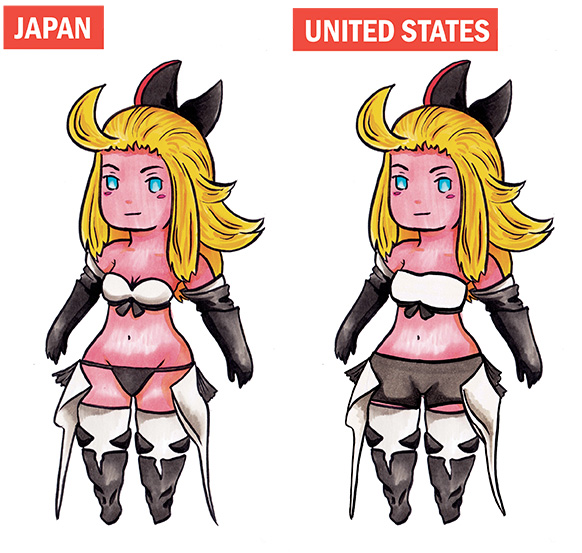Censorship issues in ‘Bravely Default’
Should American publishers make changes to localized games?
By Matt McIlnay
About two weeks ago, it came out that the Japanese role-playing game, Bravely Default, would be modified/censored in its North American release. Despite the changes amounting to little more than less skeevy outfits for a few of the female characters and some modified ages, these deviations from the original have already sparked controversy among fans. This debate over the changes brings to mind the age-old argument among anime and Japanese game fans: should localizers follow the original work as closely as possible, or alter it to try to appeal to an American audience? This is a discussion where I usually favor the latter view.
Localization isn’t just about purely translating a work from another language, it’s also a process of creating something that will appeal to a new audience. What works in Japan doesn’t necessarily work in America, which is why localizers sometimes have to take liberties. Although Nintendo’s motivations behind changing small parts of Bravely Default may have been solely to avoid controversy instead of improving the game, no real harm was done since the new costumes are more practical and arguably more aesthetically pleasing.
Due to fans taking a dim view to censorship, obvious changes such as these are rare nowadays. What it more often comes down to is whether the publisher favors a more literal (and therefore more faithful) translation of the game’s script, and whether to modify it as needed in order to create a translation that sounds as natural as possible.
Although faithful localizations sound wonderful in theory, they have a tendency to make for horrible experiences. It’s one thing to translate something into English but it’s another thing entirely to make it actually work in English. Hazy metaphors, bizarre word usage, and hilariously clunky dialogue are all consequences of overly literal translating and have sadly become one of the trademarks of localized Japanese games.
Although often difficult, the best way to fix these problems is to branch out from the original script and make whatever changes are necessary to help it flow in English. Niche publisher Atlus has excelled at this form of localization, as demonstrated in their excellently written and translated Persona series. Persona 4 is particularly notable for how the translators slightly toned down several instances regarding a main character’s struggle with his sexuality. This had the effect of creating a more nuanced and subtle portrayal of a character struggling with his sexuality, demonstrating that creative localization can actually improve upon the original work.
This isn’t to say that faithfulness to the original game is bad; rather that it shouldn’t be taken to an extreme. Localizations should be accurate, but translators should also trust their instincts. If something doesn’t quite work in English, or there’s an area of the original work that’s obviously in need of improvement, change can be for the better. To give a more specific example, it is almost always better to focus on what a character means instead of strictly what they’re saying, otherwise you run the risk of creating awkward dialogue.
If a line of faithfully translated prose sounds absolutely bizarre when read aloud in English, scrap it and start anew. If the script contains several hundred exclamations of “GAUGHHHHH” and “HMMMNF,” please leave them out. If a joke doesn’t work in English, rewrite it until it does! More blatant changes, like those seen in Bravely Default, should be considered more carefully due to the risk of restarting a trend of censorship in localized games. When it comes to localizations, faithfulness to the original game is only half the battle—concise and imaginative translating that feels natural in its new language should be prioritized over strict accuracy to the original script in all but the most niche of titles.



